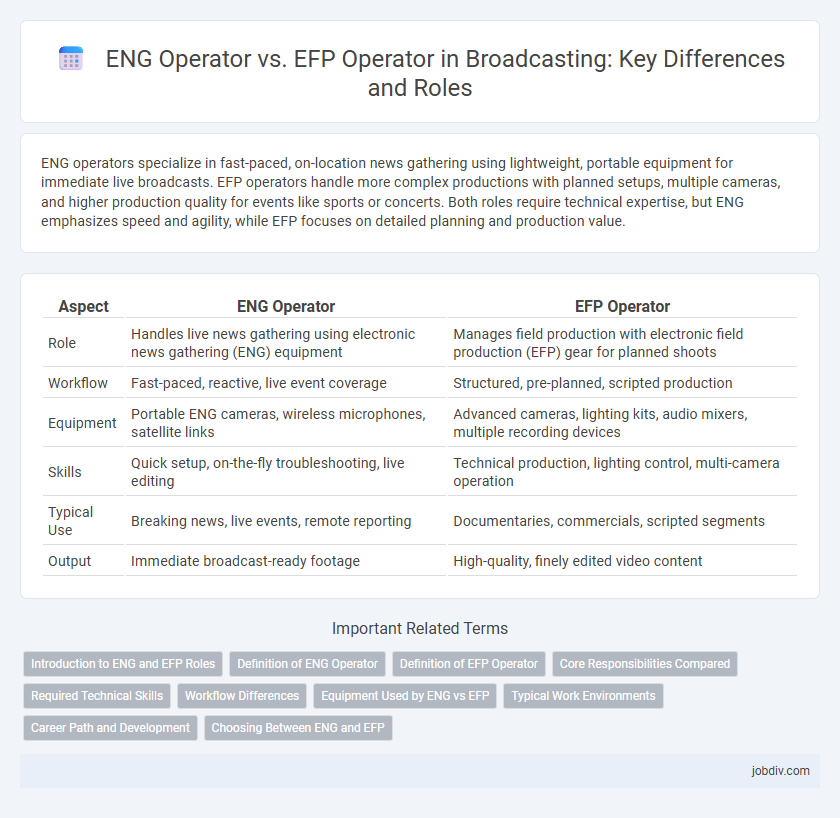ENG operators specialize in fast-paced, on-location news gathering using lightweight, portable equipment for immediate live broadcasts. EFP operators handle more complex productions with planned setups, multiple cameras, and higher production quality for events like sports or concerts. Both roles require technical expertise, but ENG emphasizes speed and agility, while EFP focuses on detailed planning and production value.
Table of Comparison
| Aspect | ENG Operator | EFP Operator |
|---|---|---|
| Role | Handles live news gathering using electronic news gathering (ENG) equipment | Manages field production with electronic field production (EFP) gear for planned shoots |
| Workflow | Fast-paced, reactive, live event coverage | Structured, pre-planned, scripted production |
| Equipment | Portable ENG cameras, wireless microphones, satellite links | Advanced cameras, lighting kits, audio mixers, multiple recording devices |
| Skills | Quick setup, on-the-fly troubleshooting, live editing | Technical production, lighting control, multi-camera operation |
| Typical Use | Breaking news, live events, remote reporting | Documentaries, commercials, scripted segments |
| Output | Immediate broadcast-ready footage | High-quality, finely edited video content |
Introduction to ENG and EFP Roles
ENG (Electronic News Gathering) operators specialize in live, on-location news coverage using portable equipment designed for rapid deployment and real-time broadcasting. EFP (Electronic Field Production) operators handle planned productions such as interviews, documentaries, and special events, utilizing advanced setups and controlled environments for higher production quality. Both roles require expertise in camera operation, sound, and lighting, but ENG emphasizes speed and mobility while EFP prioritizes precision and technical control.
Definition of ENG Operator
An ENG (Electronic News Gathering) Operator specializes in capturing live, on-location news footage using portable camera and audio equipment, ensuring quick and efficient coverage of breaking events. They manage the technical setup for real-time broadcasting, often working under tight deadlines to deliver immediate content. ENG Operators differ from EFP (Electronic Field Production) Operators, who focus on planned, controlled shoots for documentaries or scripted programs.
Definition of EFP Operator
An EFP (Electronic Field Production) operator is responsible for managing complex, multi-camera shoots outside the studio, coordinating camera angles, lighting, and audio to capture high-quality video content on location. Unlike an ENG (Electronic News Gathering) operator who typically handles fast-paced news reporting with minimal crew, an EFP operator oversees detailed production setups for events, commercials, or scripted shows. Mastery of advanced broadcast equipment and planning is essential for EFP operators to ensure seamless integration of live and recorded elements in varied environments.
Core Responsibilities Compared
ENG operators specialize in capturing live news events using portable, fast-deploying equipment, ensuring timely and dynamic coverage. EFP operators focus on planned, high-quality productions with multiple cameras and advanced setups for events like sports or concerts. Both roles require technical proficiency, but ENG emphasizes mobility and speed, while EFP prioritizes production value and coordination.
Required Technical Skills
ENG operators require expertise in live field reporting equipment, including handheld cameras and wireless transmission systems, with proficiency in rapid setup and real-time troubleshooting. EFP operators focus on advanced multi-camera setups, lighting design, and audio mixing for controlled production environments, emphasizing precision and coordination. Mastery of video encoding, signal routing, and editing software is essential for both roles to ensure high-quality broadcast content.
Workflow Differences
ENG operators specialize in rapid, on-the-spot news gathering using portable equipment to capture live events with minimal crew, ensuring swift setup and mobility. EFP operators manage more complex productions with larger crews and detailed setups, focusing on scripted, high-quality content often involving multiple camera angles and intricate lighting. The workflow of ENG prioritizes speed and adaptability in dynamic environments, while EFP emphasizes precision, coordination, and controlled production settings.
Equipment Used by ENG vs EFP
ENG operators primarily use compact, portable equipment such as shoulder-mounted cameras, wireless microphones, and mobile satellite uplinks designed for rapid deployment and on-the-go live reporting. EFP operators utilize more specialized, high-quality gear including tripod-mounted cameras, advanced lighting rigs, and multi-channel audio consoles optimized for controlled environments and multi-camera productions. The choice of equipment directly reflects the operational demands: ENG favors mobility and speed, while EFP prioritizes production value and technical control.
Typical Work Environments
ENG operators typically work in fast-paced news gathering environments, covering live events, breaking news, and on-location reports using portable cameras and minimal crew. EFP operators operate in more controlled settings such as studios, sports arenas, and event venues, where they coordinate multiple camera setups and manage complex audio-visual equipment for planned productions. Both roles require adaptability, but ENG emphasizes mobility and immediacy, while EFP prioritizes production quality and coordination.
Career Path and Development
ENG Operators specialize in on-location, fast-paced news gathering and live reporting, building skills in quick decision-making and technical proficiency with portable equipment. EFP Operators focus on structured production environments, mastering multi-camera setups, lighting, and sound design for planned shoots, often advancing into roles like technical director or production manager. Career development for ENG Operators leans towards field producer or news director positions, while EFP Operators often progress within studio production or event broadcasting management.
Choosing Between ENG and EFP
Choosing between ENG (Electronic News Gathering) and EFP (Electronic Field Production) operators depends largely on the production's scale and objectives. ENG operators specialize in fast-paced, live news coverage using lightweight equipment, ideal for breaking news and on-the-spot reporting. EFP operators handle more complex setups with multiple cameras and advanced audio, suitable for planned events, documentaries, and television shows requiring higher production value.
ENG Operator vs EFP Operator Infographic

 jobdiv.com
jobdiv.com